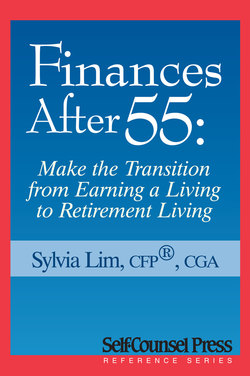Читать книгу Finances After 55 - Sylvia Lim - Страница 14
На сайте Литреса книга снята с продажи.
Financial Opportunities and Choices
ОглавлениеIt’s a little-known fact, but your early retirement years are the best years to make your investment assets grow. Plan to spend less than your assets can earn for you, and allow the excess return to be reinvested and compounded over time. This strategy is truly careful planning, and it’s very wise, too. You will need to draw on these additional resources in your passive retirement years to cover extra care and medical costs.
If you plan to spend less than your income in all your earlier years of retirement, you will be pleasantly surprised by the growth over time by the size of your asset base. Chapter 4 discusses in more detail how you can make your savings grow.
With a little luck and careful planning, your investment assets will have enough time to grow so that they can generate sufficient income to supplement your passive retirement years.
If you find you need additional funds in your passive-retirement years, you may need to convert your non-investment assets into income-generators. If you own your home, here are some options you can consider:
• Add a rental suite for extra income
• Downsize your house to a smaller dwelling to free up cash for investments and paying down debts
• Consider a reverse mortgage to supplement your income stream
• Sell your home outright and rent, and invest the cash from the sale
All phases of retirement require shrewd planning, and it’s incumbent on you to make it work. Knowing you have adequate resources to retire for the rest of your life is important. By putting your goals in writing and getting the numbers down on paper in a budget, you can commit to making your retirement years as carefree as possible. Without a plan, you may be making a leap to financial ruin.
You will find that using this guide to help you budget for all stages of your retirement years can bring you peace of mind about your financial future, and reduce your fear of running out of money in your senior years.
If you are contemplating retirement, take some time to assess your situation. Try the following:
• Complete the necessary worksheets (included online at www.self-counsel.com/updates/after55/bonus.htm) to determine your retirement goals and assess your financial situation. Revise your plan where needed to make sure you have adequate resources to cover your retirement.
• List all the advantages you can think of about retiring (e.g., being able to take advantage of last-minute travel specials in off-season periods, or having time to pursue a hobby).
• List all the disadvantages you can think of about retiring (e.g., loss of status or the boredom of having too much time on your hands).
• Compare the two lists. Decide whether the advantages outweigh the disadvantages, or vice versa.
• Discuss retirement with your spouse (if you are part of a couple) to make sure he or she has input into the process and decision.
• Obtain professional help where needed to help you arrive at a logical decision and timeline.
If, after working through all these steps, your gut feeling tells you that you are ready to retire, follow your instinct and do it.
Your retirement years are just beginning. Confront your fears and start living the best years of your life — now!
